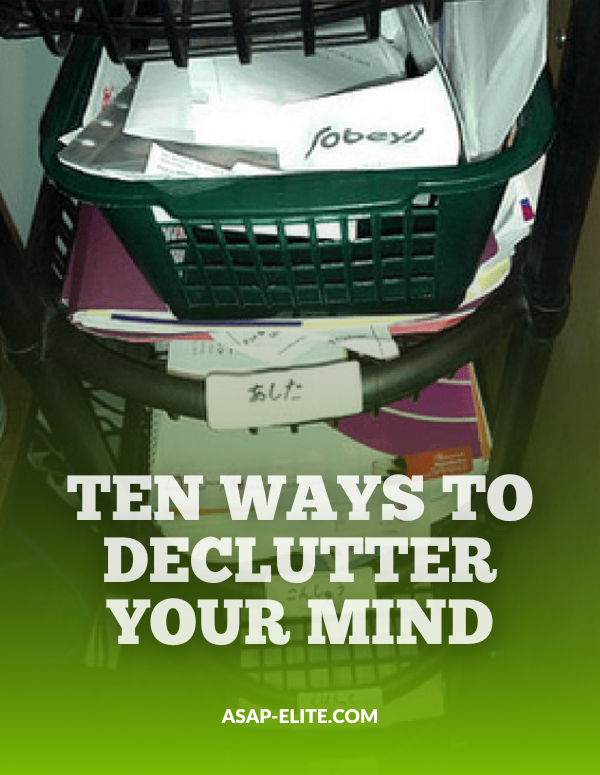Most of us have a mind full of clutter.
There’s something a lot worse than having a cluttered home or work space, and that’s having a cluttered mind. A cluttered mind is restless and unfocused. It tries to move in many different directions at once and the result is that very little gets done.
Mental clutter can include all of the following: worrying about the future; ruminating about the past; keeping a mental to-do list; complaints; and so on. Fortunately, there are strategies and techniques you can use to clean out some space in your head.
Below you’ll find ten ways to declutter your mind so you can stop feeling so overwhelmed, get more done, and gain more clarity.

1. Declutter Your Physical Environment.
Physical clutter leads to mental clutter. First of all, clutter bombards the mind with excessive stimuli, which forces the brain to work overtime. Secondly, physical clutter signals to the brain that there’s always something else that needs to be done, which is mentally exhausting. As you declutter your physical space you’ll discover that your mind is also decluttered.
2. Write It Down.
You don’t need to keep everything stored in your brain. Choose a tool—it can be an online tool, an app, or even a pad of paper—and think of it as a storage device for all those bits and pieces of information that you need to remember. This can include appointments, phone numbers, ideas for future projects, and so on.
3. Keep a Journal.
Keeping a journal is similar to the previous point, “write it down”, but with more depth. A journal allows you to download the inner chatter that’s constantly interrupting your thought process when you’re trying to get important things done. For example, you can write in your journal about the following:
- Things that you’re worried about;
- Plans for achieving an important goal;
- Concerns about a relationship that’s draining your energy; and so on.
4. Let Go of the Past.
Mind clutter is often related to the past. Most people keep a large cabinet of mental drawers stored in the back of their minds. These drawers are filled with mistakes they’ve made, opportunities they’ve missed, people they’ve hurt, past grievances, and so on.
Take the time to go through those mental drawers and discard memories of the past that are not serving you well and are just cluttering up your current life.
5. Stop Multi-Tasking.
If your house is a mess and you need to organize and declutter it, how would you begin? You would probably start by choosing one important area—for example, the kitchen table—and clearing it of all clutter.
The mental equivalent of clearing off the kitchen table is to choose a certain amount of time which you’re going to devote exclusively to one important task. During that time push all mental clutter to the side and focus all of your attention on the task at hand.
Visualize a table that is clear of all items, except for the one task which you’re going to be working on. Make sure that the table stays clear of all other items during the entire chunk of time that you’ve devoted to this task. If anything else tries to work its way onto the table, mentally push it off.
6. Limit the Amount of Information Coming In.
Too much information can clog up the brain. This includes the information that you take in each day by reading newspapers, blogs, and magazines; watching TV; participating in social media; surfing the web on your smart phone; and so on.
Limit the amount of information that comes into your life—and create space in your brain–by doing the following:
- Set a limit on the amount of time that you’re going to spend on social media sites or browsing the internet.
- Unsubscribe from any blogs and cancel any magazine subscriptions that are not contributing to your quality of life or your well-being.
- Make sure that the opinions that you pay attention to come from well-regarded individuals with relevant credentials.
- Decide what information is relevant to you and disregard everything else.
7. Be Decisive.
If your in-box is filled with documents, but you fail to make decisions on what to do with each one, what will happen? Soon, your in-box will be overflowing with letters, bills, requests from prospective clients, and so on. The way to clear your in-box is by making a decision about what to do with each piece of paper that’s in there.
The same thing applies to your brain. If you put off making decisions, your brain will soon be overflowing with all of the decisions that you need to make. The solution is to be decisive.
For simple decisions, follow an approach such as the one recommended by Benjamin Franklin: create a pros-and-cons list. When you need to make more important and complex decisions, apply a more thorough approach, such as the WRAP Method recommended by the Heath brothers in their book, “Decisive: How to Make Better Choices in Life and Work”.
8. Put Routine Decisions on Auto-Pilot.
Small, routine tasks can occupy a lot of brain space. This can include things such as the following:
- Deciding what to have for breakfast each morning;
- Deciding what you’re going to wear each day;
- Making a decision on what to eat for lunch; and so on.
You can reduce the amount of brain space that’s taken up by these routine tasks by putting them on auto-pilot. As an illustration, there’s a popular TV sitcom called “The Big Bang Theory” in which the four main characters are highly intelligent scientists. One of them, Sheldon Cooper, loves routines and has one for just about everything.
Here are some examples:
- He has a specific pair of underwear and a specific t-shirt that he wears for each day of the week.
- The food that Sheldon eats for breakfast and for dinner follows a routine (for example, every Tuesday night he eats with his friends at The Cheesecake Factory).
- Sheldon sets routines for many other activities, such as doing the laundry every Saturday night at 8:15 p.m.
Of course, Sheldon takes things a bit overboard, but you get the picture. Get as many small, routine tasks as you can out of your head by setting them on automatic.
9. Prioritize.
Nothing creates as much brain clutter as an endless to-do list. Accept that you can’t do it all, and choose to focus on the things which are most important to you. Make a short list of your top priorities, and make sure that the bulk of your brain space is devoted to the things on that list.
10. Learn to Meditate.
In essence, meditation is learning to focus the mind completely on the present moment. When you learn how to place all of your attention on one thing—such as your breath–, all other thoughts disappear. It’s almost the equivalent of taking your mind through a car wash, and having useless and unnecessary thoughts washed away.
Conclusion
Mental clutter leads to congestion in our inner world. It gets in the way of being able to think clearly, and to focus on what really matters. This year, live your best life by decluttering your mind. You can get started by following the 10 ways to declutter your mind explained above.


No comment